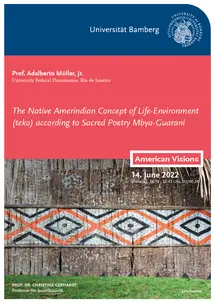Prof. Adalberto Müller, Jr. (University Federal Fluminense, Rio de Janeiro), "The Native Amerindian Concept of Life-Environment (teko) according to Sacred Poetry Mbya-Guaraní"
Tuesday, June 14,16:15-17:45, U5/00.24
Although they did not build great monuments or exceptional technical artifacts, native Amerindians of the tropical forests developed intricate relationships between nature and culture. In the set of sacred songs called AYVU RAPYTA, the Mbya-Guaraní (illiterate ancestral inhabitants of the Río de La Plata Bassin) produced and preserved a poetic cosmogony in which language (ayvu/ñe'ẽ) and love (mborayhu) work as the engine of a plural community, and in which gods, people, and the natural world behave according to a principle of reciprocity (jopói/potirõ). At the center of the conceptual, rhythmic, and imagetic web of the AYVU RAPYTA (and of the Guaraní cultures themselves) the notion of life (teko) acquires a simultaneously transcendent and practical character. Differently from Dasein, teko could be defined as a multidimensional way of living, in which a world "beyond nature and culture"(Ph. Descola) would be constantly performed and renewed, if it were not threatened by Western invaders and progress.
Adalberto Müller is Associate Professor for Literary Theory at the University Federal Fluminense in Rio de Janeiro. He was a Visiting Scholar at the University at Buffalo in 2018 and at Yale University in 2013. He translated works by Walter Benjamin, e. e. cummings, and Francis Ponge. His recent works are a book of short stories – Pequena filosofia do voo, 2022 – and a collection of essays on image and literature (A imagem sob a imagem, 2022). He also translated the complete poems of Emily Dickinson into Portuguese: Emily Dickinson. Poesia Completa, Editora da UnB, 2020/ 2021 (2 vols.). As Gastwissenschaftler at the Universität Trier (2022-2023), he writes on and translates from the Guaraní (Mbya and Kaiowa) in European languages.
